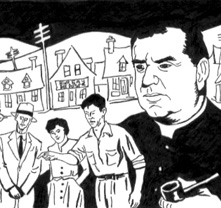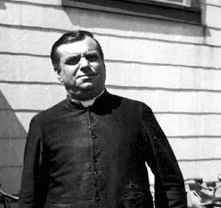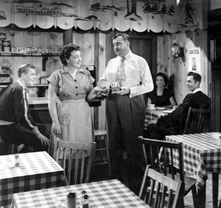Ovila Légaré (1901-1978)
-

A drawing of the film Le curé de village (Paul Gury, 1949) by Claude Jutra.
Source : Cinémathèque québécoise, 1981.0033.33.AR.02
-

Ovila Légaré in the role of the priest in the film Le curé de village (Paul Gury, 1949)
Source : Cinémathèque québécoise, 1995.0896.PH.02
-

Ovila Légaré and Juliette Huot in Le rossignol et les cloches (René Delacroix, 1952).
Source : Cinémathèque québécoise, 1995.2443.PH.01
A Multifaceted Actor
Oliva Légaré first earned his living as a typographer. At the age of 20, his natural gift for the theatre and his love for traditional music led him to the performing arts. He was a folklorist who sang traditional songs and “called” square dances. He soon began to record popular songs, alone or with stars such as Juliette Béliveau and La Bolduc (Mary Travers). He composed and acted in comic sketches and for radio and performed in radio serials. On stage, he could be found in everything from nutty comedies to pieces by Marcel Pagnol and tragedy.
Playing Authority Figures in Film
In film, his imposing presence and bass voice made him a natural choice to play figures of authority. He was also at home in the role of the priest in Le père Chopin and in Le curé du village, an adaptation of the radio serial by Robert Choquette, which was one of his finest performances. In Un homme et son péché, he gave a subtle rendering of the miserable Laloge, who sells his daughter to Séraphin in order to keep his land—and his honour! Légaré could then be found playing a detective in La forteresse and a kindly restaurant owner in Le rossignol et les cloches. He also acted in two American films shot in Quebec, I Confess by Alfred Hitchcock and The 13th Letter by Otto Preminger.